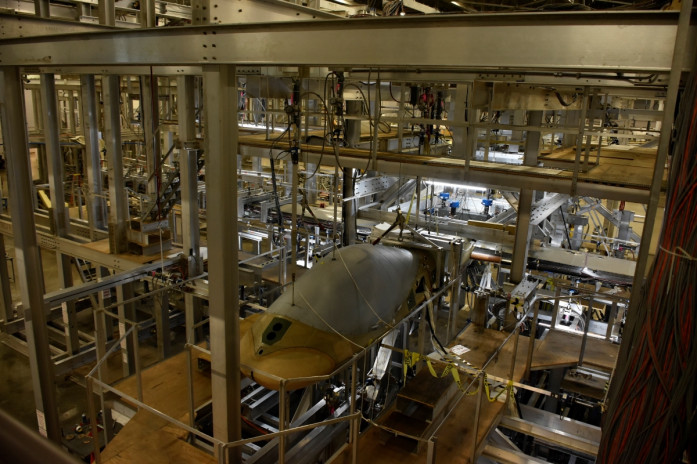SAN DIEGO, CA, Oct 15, 2024 - (ACN Newswire) - On Sept. 30, 2024, General Atomics Aeronautical Systems, Inc. (GA-ASI) completed a major milestone with the full-scale fatigue testing of an MQ-9B Remotely Piloted Aircraft (RPA). The team completed the "second lifetime" of fatigue testing, which is equivalent to 80,000 operating hours and represents an important step in validating the design of the airframe system. The testing is part of the aircraft certification to NATO standard STANAG 4671, where the aircraft will ultimately be tested through three lifetimes, thereby proving the 40,000-hour lifetime of the airframe.

The full-scale fatigue test simulates the aircraft's design service through the application of repeated structural loading on the assembled airframe. The testing identifies any potential structural deficiencies ahead of fleet usage and assists in developing inspection and maintenance schedules for the airframe. The results of the test will be used as part of the documentation for certification and will form the basis for in-service inspections of structural components.
MQ-9B is GA-ASI's most advanced RPA and includes the SkyGuardian® and SeaGuardian® models as well as the new Protector RG Mk1 that is currently being delivered to the United Kingdom Royal Air Force (RAF).
"Full-scale fatigue testing is an integral part of validating the airframe design and a key input for the certification of the airframe prior to entering service," said Chris Dusseault, vice president of MQ-9B in Europe. "The completion of the fatigue test builds confidence for our MQ-9B customers that the SkyGuardian/SeaGuardian meets the stringent design rigor and is mature at Entry into Service."
The testing is the validation of years of design and analysis efforts. This is the second of three lifetimes of testing for the airframe. Two of the lifetimes simulate the operation of an aircraft under normal conditions, and the third has intentional damage inflicted on the airframe's critical components to demonstrate its resistance to operational damage that may occur over the lifetime of the air vehicle.
Testing was conducted from Jan. 31, 2024, through Sept. 30, 2024, at Wichita State University's National Institute for Aviation Research in Wichita, Kansas. The airframe tested is a production airframe purpose-built to support the test campaign.
In addition to the RAF, contracts have been signed for MQ-9B with Belgium, Canada, Japan, Taiwan and the U.S. Air Force in support of the Special Operations Command. The Japan Coast Guard is currently operating the SeaGuardian for maritime operations, and the Japan Maritime Self-Defense Force (JMSDF) selected SeaGuardian for its Medium-Altitude, Long-Endurance (MALE) RPA System Trial Operation Project.
About GA-ASI
General Atomics Aeronautical Systems, Inc. (GA-ASI), an affiliate of General Atomics, is a leading designer and manufacturer of proven, reliable RPA systems, radars, and electro-optic and related mission systems, including the Predator® RPA series and the Lynx® Multi-mode Radar. With more than eight million flight hours, GA-ASI provides long-endurance, mission-capable aircraft with integrated sensor and data link systems required to deliver persistent situational awareness. The company also produces a variety of sensor control/image analysis software, offers pilot training and support services, and develops meta-material antennas.
For more information, visit www.ga-asi.com.
Avenger, Lynx, Predator, Reaper, SeaGuardian, and SkyGuardian are registered trademarks of General Atomics Aeronautical Systems, Inc.
Contact Information
GA-ASI Media Relations
asi-mediarelations@ga-asi.com
SOURCE: General Atomics Aeronautical Systems, Inc.
Topic: Press release summary
Source: General Atomics Aeronautical Systems, Inc
Sectors: Aerospace & Defence
http://www.acnnewswire.com
From the Asia Corporate News Network
Copyright © 2026 ACN Newswire. All rights reserved. A division of Asia Corporate News Network.
|